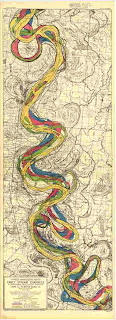A Jewish/Christian Haggadah and additional meditations and reflections for 35 days of the Omer count
Containing the Seder steps, pictures of various scenes along the MS river taken from the air, some Gospel songs of Ms Madonna Woods, a discussion of the four sons,a continuation of the translation of the Hallel begun in April 7,10 2007, and a discussion of a Christian parable interpretation of who the two goats in the prescribed Torah service are.
Figure 1
MS river as seen from 9500’ approaching Cairo, ILL, 89 deg. 05’ longitude, 36 deg. 3’ latitude, 6/30/2009
“Deep river, my home is over Jordan,
Deep river, Lord, I want to cross
Over into camp-ground.
Oh, don’t you want to go over
To that gospel feast,
That promised land where all is peace.”
From Favorite Spirituals by Ear arranged by Madonna Woods, Davidson’s music.
May it be Your Will to Favor Us
(on this Holy Day)
The following prayer is said by Jews during community meal services which occur on the Sabbath:
Ratzehh v’hachalaytzeenu YHWH Elohaynu b’meetz’otehach, v’b’mtzot Yom hash’bayay hashabat hagadol v’hakodosh hazehh, Kay yom zeh gadol v’kodosh Hu l’phanehyach, l’sha’bat bo lan’oach bo bahavah k’mitzot r’tzoneehach, v’beer’tzon’ach hanayach Lanu YHWH Elohaynu. Sheelaa t’hay Tzrah v’ yagon v’anacha baYom b’nochatanu, v’hraynu YHWH Elohaynu b’naychamah Zion aorayach, v’b’beenyahn Jerusalem Or kad’shach, cai Atah Hu bayl hayshoaaot v’bayl hayn’chamot.
May it please You YHWH, our God…to give us rest (to allow it by saving us from troubles and thereby strengthening us as we realize Your powers to help us) through the performance of Your commandments and through the commandment of the seventh day, this great and holy Sabbath. For this day is great and holy as it is itself a Presence (of Your Face) before You to rest on it and be content on it in Love, as ordained by Your will. May it be your will, YHWH, Our God, that there be no distress, grief, or lament on this day of our contentment. And, show us, YHWH, Our God, the consolation of Zion, Your city, and the rebuilding of Jerusalem, City of your holiness, for You are the Master of Salvations and Master of Consolations.
There is naturally some question among theologians about why God would favor Jews and Israelites, in particular, among all of us. What this means is that God has shown “grace” to Jews (in a similiar way that he shows “grace” or “favor” to Christians who believe in his Son for their salvation). It is in God’s nature to want to show grace to all of us. Even as happiness consists in being able to see and find the good in every thing and every person (for every thing and every person is good in its/their own way) so God’s grace or salvation is found in different ways in different people. But for any one individual or people there is only one way to discover it. For Jews and Israelites salvation comes through the group and not the individual. And, it is so that he has “favored” or saved through grace his people Israel. God has also favored the Christian Church which is made up of those who believe in His Son Jesus Christ and the effects of his life on earth two thousand years ago for their individual salvation and grace. What most people do not understand is that God’s salvation, redemption, justification, sanctification through Christ in any of us cannot be complete until it is known as being able to occur in all of us.
To be a human angel (eternal spiritual being who is a friend of God and a servant or helper of God) living here on earth one must be able to receive and understand God’s philosophical and theological enlightenment of universal salvation and how it occurs in these many different ways. This particular form of human understanding of salvation in all of us was brought to us several hundred years ago in Europe and carried over by our forefathers on the Atlantic ocean to this blessed new land of the Americas.
Some Jewish customs on Passover.
Taken from “The Jewish Art Calendar, 2010” by Mickie
We ask the question at the Passover table:
“Why is this night different from all other nights?”
Answers
1) “On all other nights we eat leavened bread or matzah, on this night only matzah.”
2) “On all other nights we eat herbs of any kind on this night only bitter herbs.”
3) “On all other nights we do not dip herbs even once”
4) “On all other nights we sit or recline, on this night we recline.”
Figure 2
Taking off from Paducah KY. View is from 7000’ altitude of Lake Barkley (shown below the Cumberland River which proceeds toward Nashville, TN) 88 deg. 28 ‘ long. 36 deg. 48’ latitude.
7/1/2009
“Well I look o-ver Jordan and what did I see,
Com-in’ for to car-ry me home?
A band of an-gels a-com-in af-ter me,
Com-in’ for to car-ry me home.
Swing low, sweet char-i-ot,
Com-in’ for to car-ry me home.”
From “Favorite Spirituals by Ear” by Madonna Woods, Davidson’s music
Taken from a OurPrayerGroup.blogspot.com posting 2007
The 15 steps of the Passover Seder
(forming a Jacob’s ladder from heaven to earth)
First three
1)hakadesh
Santification
3)karpas 2) urachatz
(vegetables, wash hands)
Second three
6)rachtzah 5)maggid 4) yachatz
(wash hands,tell story, break middle matzoh)
Third three
8)maror 9) matzah 7)motzyaa matzah
(bitter herb, bread of life, grace before meal)
Fourth three
12)tzaphun 11)shulchan arayrech 10)koraych
(eat middle matzah, eat meal, bitter herb sandwich)
Fifth three
14)hallayl 15) nirtzah 13) baraych
(praise to God, prayer for acceptance, grace after meal)
Blessed is the One*
The joy that is in this song proceeds from my mouth to thank, to praise, to glorify my creator.
Haray…nay m’zamen et pay l’hodot ul’halayl ul’shabe..ach et bor’ee.
Baruch shamar v’hayah holam. Baruch Hu.
Blessed is the One by whose speech the world came to be. Blessed is he.
Baruch oseh b’raysheet.
Blessed is the One who creates everything.
Baruch omayr v’oseh.
Blessed is the One who creates by speaking.
Baruch gozayr vm’kayaym.
Blessed is the One who sustains by decreeing.
Baruch m’rachaym al ha…retz.
Blessed is the One who has mercy on the earth.
Baruch m’racharm al hb’rayyot.
.
Blessed is the One who has mercy on all creatures
Baruch m’shalaym shachar tov leerayav
Blessed is the One who rewards those who fear him.
Baruch chay lad v’kyam l’ne…tzach.
Blessed is the One who lives forever and endures for all eternity.
Baruch phodeh vmatzeel. Baruch sh’mu.
Blessed is the One who saves by redeeming. Blessed is his name.
* here are some thoughts and comments on this wondelful prayer, gained after many years of praying it: Among many of the purposes and benefits of this prayer
it helps us better understand how our faith is “The light of the One increasing”.
The One God in this prayer is undivided, but he is also an individual inside
of multiplicity. He speaks as well as acts. That is he does what he says, acting by speaking (decreeing). He has created all of us…and, he is compassionate to us all as different types of beings. Thus, when we dedicate
the merits of our own actions to the glorification and sanctification of his name, we are at the same time dedicating them for the benefit of “all sentient beings.” We have preserved in him the name of a responsible person that we can dedicate the merit of our work to… not just an absolute consciousness inside of us all. Our God is both the “Totum Bonum” (total good) and the “Summum Bonum” (highest good). This prayer affirms that, for us, he cannot have one of these titles and purposes without the other; and not the other without this one.
He or she who has God’s love in their heart and knows the total good that God has placed in our souls and spirits…they are themselves a source and blessing of his or her hope and this Good unto others.
He or she who has God’s love in their heart and knows the highest good that God has placed in our souls and spirits…they are themselves a source and blessing of his or her faith and this Good unto others.
SOME PRAYERS THAT COME FROM BEFORE THE HOLY COMMUNION*
“Let this holy communion be to me, O God, a beginning of better things, as if only now I began to know Thee. Let me now and henceforth forsake that which has tempted me. Let me now and henceforth do those things that I have perceived to be of Thy will for me; by the grace of the Holy Spirit, and the intercession of Jesus Christ, our Lord. Amen”
“Take away from us, we beseech Thee, O Lord, all our iniquities, and the spirit of pride and arrogance, which Thou resisteth, and fill us with the spirit of fear, and give us a contrite and humble heart, which Thou dost not despise; that we may be enabled with pure minds to enter into the Holy of Holies: through Jesus Christ, our Lord, Amen”
INVOCATION
Glory be to the Father, and to the Son, and to the Holy Spirit; as it was in the beginning, is now and ever shall be world without end. Amen
PRAYER FOR PURITY
Almighty God, unto whom all hearts are open, all desires known, and from whom no secrets are hid, cleanse the thoughts of our hearts by the inspiration of thy Holy Spirit, that we may perfectly love Thee, and worthily magnify thy holy Name, through Jesus Christ our Lord. Amen
THE INVITATION
Ye that do truly and earnestly repent of your sins, and are in love and charity with your neighbors, and intend to lead a new life, following the commandments of God, and walking henceforth in his Holy ways, draw near with faith, and take this Holy Sacrament to your comfort (standing while you are forgiven by the Almighty God ).
THE GENERAL CONFESSION
We believe in One God, maker of all things seen and unseen, and in his only Son Jesus Christ…eternal light and life to and from eternal light and life…loving and true God to and from a loving and true God…born of the Virgin Mary and Our Father in Heaven, Son of Humankind, suffered under Pontius Pilate, crucified dead and buried. On the third day he rose from the dead and ascended into heaven where he sits at the right hand of the throne of God. We believe in the Holy Spirit, the Lord the giver of life, the communion of Saints, the forgiveness of sins, and the resurrection of the body. Almighty God, we acknowledge and confess our manifold sins and wickedness, which from time to time we have most grievously committed, by thought, word, by deed and by omission of act against thy Divine majesty in heaven and that of you inside of our brothers and sisters, your creations, here on this earth. We do earnestly repent and are heartily sorry for these our misdoings. Have mercy upon us, have mercy upon us most merciful Father; for thy Son our Lord Jesus Christ’s in us sake, forgive us all that is past; and grant that we may hereafter serve and please Thee in newness of life, to the honor and glory of thy name, through Jesus Christ our Lord. Amen
* From a Pocket Prayer Book, Complied by Bishop Ralph Spaulding Cushman and published by the General Board of Evangelism, United Methodist Church, The Upper Room, Nashville, TN, 1941. Note there are some slight changes in the text of the general confession.
A 10-Fold list of Biblical Words of Creation of Jesus Christ in the Holy Spirit in US
1) YHWH Shammah (Ezekiel 48:35) The Lord is present
2) Elohim Yireh (Genesis 22 8-14) The Lord will provide for us
3) YHWH Rohi (Psalm 23) The Lord will guide us
4) YHWH Raphael (Exodus 15:26) The Lord God heals
5) YHWH Nissi (Exodus 17:15) The Lord is our banner
6) YHWH Mekadishkem (Exodus 33:13;22, 34:6-9, Leviticus 20:8;21:8;22:9,16) The Lord our Sanctifier
7) YHWH Tzidkeenu (Jeremiah 23:6,33:16) The Lord is our righteousness
Seven of these names of God manifest themselves as God inside of different spiritual places in our individual spiritual bodies…They are very similar to the seven I am meditations that Jesus Christ speaks about himself in the Gospel of John.
The other three invoke God, as being greater than each of us, but, inside of all of us..
We can meditate on the first seven, then the last three…then the first seven as the last, the first three after that and then the first three twice as the first again (which makes a total of 26 the numerical value of the Hebrew letters in God’s name the Tetragrammaton. This name is the most sacred name of our creator, the father of Jesus Christ, the Word or concept, of God. His only Son or concept of himself inside of us being the most sacred person or the most sacred lifting up him upon us. He is an image and likeness, the face of our God in us that is with us in the present moment now and which we can worship as God among us on this earth today…If we have faith we can, with his help, do this in order for our souls to go forwards and backwards in time
8) Yah YHWH Saboath (1 Samuel 1:3) The Lord God of Hosts
9) Yah YHWH Elohim (Genesis 2:4-25) God as the Lord God
10) Yah YHWH Shalom El Chai (Judges 6:24) The Lord God of Peace and Eternal Life
Also, it is possible to translate the first five of these Hebrew Juhuda prayers into some thanksgiving, affirmative, petitionary words of Greek, European, English, and American Christianity:
1) YHWH Shammah iff God and their/our Son Jesus Christ are present in us.
2) YHWH Yireh iff God and Christ Jesus are our providence.
3) YHWH Rohi iff God and Jesus Christ enlighten us and are the head of us (our leaders).
4) YHWH Nissi iff God and his/her/our Son Christ Jesus hold the whole world in their hands.
5) YHWH Rapha iff God and our Son Jesus Christ are our healers.
Some remembrances and praise to the teacher of Saint Andrew (Jesus Christ, the greatest and most exalted man on earth) from his apostle
Jesus Christ, you are the door to Heaven for us…
This becomes true once we remember you are our light and the knowledge of that which nourishes and sustains us eternally.
Jesus Christ, you are the way the truth and the life for us…
Once we go through the doors you open for us on this earth
You are the joy and jubilation for us…
This becomes true once we remember that you are our resurrection and our life.
Figure 3 photo from 11,500’ , 36 deg, 20 min. latitude 105 deg. 15 min. longitude along route from
Las Vegas CO to Cimmaron CO. Twin peaks of the Sangre de Cristo mountain range and the Philmont
Eagle scout ranch in the background.
The twin peaks are Eagle Nest Peak at 13,161’ and another at 12,441’ 10/24/2008.
Photo 18
Central to the Jewish teaching for Passover in the Haggadah there is the
discussion of the four different types of sons:
( there are also four different types humans know about God, the World, and
Each other:
1) We can know that we don’t know something.
2) We can not know something and not know that we don’t know it.
3) We can know something and know that we know it.
4) We can know something and not know that we know it.
1) The wise son or daughter, who asks to be taught, whom we should tell
everything (so he or she can be independent of us) when we are teaching him,
Chocham, mah hu omayr? Mah haodot v’ hachukim v’hamsh’phatim aser tzoach
Adonai Elohaynu etachehm V’af atah ehmor lo k’heel’chot haphehsah. Ayn
maph’tirin echar haphasach aphikoman.
The wise son, what does he say? “What is the meaning of these laws and
ordinances which the Lord Our God has commanded us?” What then do we say to
him to teach him about Pesach? Nothing is left out, including the rule that
nothing is eaten after the Afikoman
In my opinion the wise son is he who knows that he does not know something.
2) The evil son who thinks he is different( better) than others. For, he
thinks that we don’t need to interact and work together with others. Him, or
her we should confront. But, not because he or she is different from us.
Indeed they are our sons and daughters too.
Rash amah hu omayr? Mah haobodah hazoach lachehm? L’chehm v’lo lo.
The wicked son, what does he say? “What is the meaning of this that is
commanded to you?” (that is he says this to you and not himself).
Vol’phi shehhotzi et atz’mu mean hach’lehl v’chehpahr baakehr. V’af atah
hak’hayh et sheenavm emar lo:
Because he says it this way he has removed himself from us (the community)…
even he has denied the laws said to him.
Bobor zehh ashah Adonay Eloheynu B’tzati meemeetz’rim. Li v’lo lu. Elu hayah
sham lo hayah neeg’al.
Answer him by saying it is because of that which has been done by the Lord
God for me when I came out of Egypt. “For me” and not “for him”. Had he been
there, he would not have been redeemed.
Is not the evil son like some one who doesn’t know something (what we want to
teach him) and doesn’t know that he doesn’t know it.
It is easy to make a mistake here if we try and connect this part of the Haggadah with the service in the temple where two completely different sacrificial animals (the scapegoat and the sacrificial lamb) come before the priests to be dealt with differently. According to the Torah the scapegoat (who is called Belial ) is to be released and sent away out into the wilderness. This animal is to wander further and further out into the realm of harsh worldly truth (coincidently the nation of Israel ended up doing this for centuries before it was finally able to reestablish itself ). This may seem to follow if we identify the scapegoal Belial with the evil Son who thinks he is different from others in this part of the teaching of the Haggadah. The lamb although it is sacrificed remains in the realm of mercy and spiritual heaven inside of the community of Israel. God’s Son, Jesus
Christ clearly thought a lot about this teaching and these two animals and this service as commanded in the Torah. His parable of the prodigal Son in the Gospels relates to it. According to the New Covenant established in the Gospels we are not to differeniate in terms of the way we love others who are different. We are to love others not on the basis of how they understand truth but all equally and unqualifably as “ourself”. For those who understand this teaching in this manner the differences in the four Sons do not affect our love but only the way we teach each of them. Even though the prodigal Son chooses to search for meaning in the outside World instead of in his Father’s realm His Father in the parable of the Gospels mercifully accepts him back and forgives him as if nothing had happened (does not reject him back out into the Worldy realm as the scapegoat is rejected back by the priests in the sacrifical Torah service).
3) the simple son or daughter, whom we should assist by teaching him or her
to expect miracles and giving them a simple and easy to understand answer.
Tam mah hu omayr? Mah zoat? V’amar’ta elav. B’chazehq yad hotzianu Adonai
meemeetz’rim, meebayt abhadaym.
The simple son, what does he say? What is this? And, the answer to him:”With
a mighty hand Adonay brought us out from Egypt, from the house of bondage.
The simple son is some one who knows something and know that he knows it
(because what we have taught him is indeed, though a simple interpretation of
thing, what he knows).
4) What about the naïve but potentially good son or daughter who hardly knows
what to ask as a question or how to ask it? Them we should assist by treating
them special and using all our advanced techniques of breathing, assisted
contemplative prayer. But, we leave out the part above about the miracles and
the mighty hand,
V’shehaynu yoda lee’shol et patach lu? Shehnehmar: Vhagad’ata bhayom hahu
limor:
Bhovor zeh ashah Adonai Eloheynu bh’tzati meemeetz’raym.
And, what about him who does not know how to ask the question? (We quote from
the Torah) “And, on that day you shall teach him.” “We do all of this because
the Lord Our God brought us out of Egypt.”
The naïve son is some one who knows something (thinks that he knows it), but
he doesn’t actually know it yet (since we haven’t taught it to him yet).
Passover/Easter Poem
On Palm Sunday they asked:
“Who are you?”
“And, where do you come from?”
“I come from above,
where I live with the Peace dove.”
On Passover he said:
Know me and you shall be known,
even as you know.
Be still and know who you are,
and you shall be who you are (I am).
“If you will not be who you are,
then who will be?”
“And, if not now, when?”
Figure 4
Flying a VFR path I through the clouds at 10,700’ 87 deg. 11’ 34 deg. 17’. 7/1/2009
To God Be The Glory
Words Isaac Watts 1718
Psalms of David
“Praise the Lord,
Praise the Lord,
Praise His name,
Let the earth hear his voice,
Let the people rejoice.
O come to the Father through
Jesus the Son,
And give Him the glory,
For the good things he has done.”
Galatians 1:4-5
“Great is the Lord and most worthy of Praise
“We are climbing Jacob’s lad-der!
We are climbing Jacob’s lad-der.
We are climbing Jacob’s lad-der,
Sol-diers of the Cross.
If you love Him, why not serve Him!
If you love Him, why not serve Him,
Soldiers of the Cross.”
From “Favorite Spirituals by Ear” arranged by Madonna Woods, Davidson’s music
Prepartory affirmation to be said and meditated
On by the speaker (and listener) before speaking (or listening to) the truth
Contained in the following translation:
“Thou art worthy O Lord,
To receive glory and honor…
Glory and honor, forever…
And ever…
Thou have created our being,
Bless our creator.
Amen”
An original transliteration and translation of the Half Hallel from the Hebrew by Andrew as it appears written in “A Passover Haggadah” by
Elie Wiesel as the fourteenth step in the Jewish Seder. Much of the commentary is from “The Complete Artscroll Seder” published by Mesorah Arts.
Figure 5 North of Vicksburg,MS (on the Louisiana side of the river) 9500′ altitude lat. 32 deg. 26 min long. 91 deg. 03 min.
The Third Cup of Salvation is drunk at this point.
This blesing cup symbolizes God’s promises to sustain us
and uphold us [even as the Hebrew letter vav is an upholding]
in our quest for the completion of the process of our spirtiual freedom.
Half Hallel
Psalms 115:1-11
12-18
116:1-11
12-19
117
118 1-4
5-24
25
26-29
The Talmud explains why a festival which has the same offerings on all days
(like Passover) should have a half-hallel instead of a full one. Having a different
sacrifice on different days indicates a fuller creative spiritual manifestation.
alternate words translations are enclosed in [ ]
some are from “A Mystical Haggadah” by Rabbi
Eliahu Klein” North Atlantic Books
Lo lanu Adonai, lo lanu, kay l’sheem’ach tayn, kavod, ayl chas’d’ach, ayl
ameetehach.
Not for us Lord, not for us, but for the sake of the glory and grace in your
name, in your loving kindness, and in your truth.
(115:1 We pray that God will answer our prayers, not for our own sake,
but for His and His name’s sake …His name’s sake being full of true glory
[in order to manifest glory],
eternal kindness, and truth[graciousness].
Lamah amru hagoyim, esh na elohayhem bashamayem; kola aser chaphaytz aseh.
Why should the gentile nations say, “Where is our God?”. Our God is in the
heavens, and he does what he desires (wills).
Atzbayhehm kehsehf v’zahav, masheeh y’day adom.
Their idols are silver and gold, the work of the hands of man.
Peh lahem v’lo y’daybayru, aynayim lahem v’lo yayr’a.
They have mouths, but they cannot talk[utter a word],
eyes but they cannot see[envision].
Az’naym lahem v’lo yaysh’maru af lahem v’lo y’dayhu.
Ears, but they cannot hear[listen], noses, but cannot smell[inhale the aroma].
Y’dayhem v’lo y’mayshon, rag’layhem v’lo y’halaychu;
They have hands but cannot feel[touch] with them, feet which cannot walk[dance];
Lo yeh’gu bheg’ronah ch’mohem y’h’yu ashayhem, chol aser btach bahem.
They cannot make [utter] sounds with their throats, their makers, and all who
trust[identify] in them, shall become like them.
Israel, bh’tach b’Adonai ehz’ram vmageenam hu.
Israel trust in Adonai (Our Lord), He is their help and shield[guardian]!
Bayt Aharon, bheetachu b’Adonai az’ram v’mageernam Hu.
House of Aharon, trust in Adonai, He is their help and shield!
Y’ray Adonai, bh’’hu Adonai az’ram v’mageenam Hu.
Those that fear the Lord…trust in the Lord (Adonai). He is their help and
shield.
(115:9-11 There are three kinds of Jews, 1)Israelites—are those who cling to God
because they feel He is their Father. 2) House of Aaron—are those who cling to God
out of love only, 3) those who do it out of fear of Him)
Adonai z’charanu y’barayach, y’barayach et bayt Israel, y’barayach et bayt
Aharon.
May the Lord [or ‘the Lord will”] remember us and bless us, may He bless the house of Israel, may
he bless the house of Aaron.
Y’barach yeer’ay Adonai, hak’tanaym am hag’doleem.
May all those who fear the Lord be blessed, the small and the great.
Y’sayf Adonai alaychehm, alaychehm v’al bh’naychehm.
May the Lord increase his blessings unto you [or “increase you”], unto you and your children.
(115:14-15 The true nature of blessing means increase and abundance Ibn Exra.
When we are praying with God all it takes to receive this blessing of increase and abundance,
Is to open our hearts and minds faithfully and mindfully to His Grace. The blessing is repeated
Three times since each successive group mentioned above possesses a
Different level of faith.)
Bh’rochaym atem l’Adonai, asayh shamaym varehtz.
May you be blessed by the Lord who made with his hands heaven and earth.
Hashamaym shamaym l’Adonai, v’aretz natan leebh’nay adam.
The heaven of the heavens is the Lord’s [or ‘the heaven is the Lord’s heaven”], but the earth he gave to Adam
(humankind).
Lo hamayteem y’hallellu Jah, v’lo kal yir’day domah.
The dead do not praise Jah, nor those that sink into silence.
Vaanch’nu n’barach Jah matah v’ad olam; Hallelujah.
But we will bless Jah, now and forever; Hallelujah.
Figure 6 Corps survey maps of the area of the MS river near Vicksburg. The city of Vicksburg is at the map’s lower right corner. The years the surveys were made are color coded as in the figure
Eagle Lake, Chotard Lake, Mayersville, the Great River Road Hwy 1 (which are referenced in other photos in this blog are above Vicksburg on the MS side.
Figure 7 North of Vicksburg, MS, approaching the Vicksburg/Talluhah airport from the Louisiania side of the river.
Psalm 116
Ahab’tay kay yesh’ma Adonai et kolay, t’chanunay.
I love it when the Lord hears my call, receiving my appeal .
(according to tradition these verses are a resurrection song
Sung by Jews on the final day of Judgement as it occurs during the
Festival. It is also written to encourage us to expect God
To hear and answer our prayers. Being Christian means we
Believe the death, burial, and resurrection of Jesus Christ
Has already occurred and will foreshadow our own.)
Kay heetah az’nu lay, vb’yamay ehk’ra.
For he has turned his ear to me, when I called [while I was alive].
Aphaph’unay chehv’lay moeht, vm’tzaray sh’aol m’tza’onay; zerah v‘yagon
ehm’tz.
I have been surrounded by bonds [chains] of death, and caught in a narrow path of
distress; faced by trouble and sorrow [trouble and sadness].
V’b’shaym Adonai ehk’ra, anah Adonai, mal’tah naph’shay.
I called on the name of the Lord, “Please Lord…save[liberate] my my soul!”
Chanon Adonai v’tzarayq, v’Elohaynu m’racham.
Gracious is the Lord and righteous[divine and just]…
In compassion, He is our God[our God is merciful].;
Shamayr ph’taaym Adonay; dal’tay v’lay y’hoshay…
The Lord guards the simple[the innocent]; I was poor and ailing[humbled] and he saved me[liberated].
Shobay nayph’shay leem’nochaychay, kay Adonai gamal alay’chay.
Rest my soul, again, for the Lord has been kind to you[acted graciously toward me].
Chay cheelaytzata naph’shay meemaot, et anaynay meen deem’ah, et rag’lay
meedehtay.
For he has delivered[released] my soul from death, my eyes from tears, and my feet from
stumbling.
Et’halach leeph’nay Adonai, bh’ar’tzot hachayeem.
I shall walk [journey with God befor me] before the Lord in the land of the living.
Haem’n’ay chay adaybayr, anay an’yatay m’od.
I kept faith with what had been spoken..I cried out even
[even when I cried while suffering].
Anay emayr’tay, kal hadam kzav.
I cried out in my affliction, “All mankind is a liar[all men are deceitful].”
Mah ashayv l’Adonai kal tag’mol’otay alay. Chos y’shoaot asha, v’b’shaym
Adonai ehk’ra.
How shall I repay the Lord for all his blessings? I shall raise the cup of
salvation and call upon the name of the Lord.
(116:12 the cup of salvation mentioned here refers to the four thanksgiving cups
Of wine in the seder service representing respectively 1) salvation, 2) redemption,
3)justification, 4)santification.)
N’deray l’
Adonai ashalaym, nehg’dah-na l’chehl amu.
I will redeem my vows to the Lord in the presence of all his people.
Y’kar bh’aynay Adonai hamaotah lachasaydayy anah Adonai, chay anay eb’dehach,
any eb’dehach ben amehtahach;pheet’h’ta l’mosaray.
The death of his faithfully beloved is difficult to the Lord’s eyes. Please,
Lord, I am your servant, I am the child of your handmaiden, You have released
my bonds.
L’ach ehz’bhach zehvah todah, vb’shaym Adonai ehk’ra.
I will sacrifice to you an offering of thanksgiving and call upon the name of
the Lord
N’daray l’Adonai ashalam, nehg’dah-na l’cal amu.
In the presence of all his people I will redeem my vows to the Lord.
Bh’chatz’rot bhayt Adonai, bh’tocaycay Jerushalem: Hallelujah!
In the courts of the House of the Lord in Jerusalem..Halleluah!
Figure 8 MS river bridge at Vicksburg, MS 3500′
Psalm 117
Hal’lu et YHWH, cal goyim, shab’chuhu cal habmaym, kay gabar
Alaynu chas’du, v’emet YHWH l’olam, hal’luyah.
Praise YHWH, all nations; praise Him all the states! For His kindness has overwhelmed us,
And the truth of the Lord is eternal, Halleluyah!

Figure 9
The City of Vicksburg from the Louisiana side of the river flying at 7000′
Cessna 182 8189G
Psalm 118 1-4
(this entire Psalm follows a repetitive pattern to praise God.
Each new theme is repeated in the next verse or two in slightly
Different words.}
Hodu l’YHWH kay tov, kay l’olam has’du.
Yamar na Israel, kay l’olam has’du
Yamar na bayt Aaron, kay l’olam has’du
Yamr na yeeray YHWH, kay l’olam has’du
Give Thanks to the Lord for He is good, His kindness endures forever.
Let Israel say: His kindness endures forever.
Let the House of Aaron say: His kindness endures forever.
Let those who fear the Lord say: His kindness endures forever.
(the verses in this first part of the Psalm are recited aloud by the prayer leader, after each verse the
assembly responds, “Give thanks to the Lord for He is good, His kindness endures forever. Some patience, confession of personal shortcoming, offering up the solution of one’s problems to God, humble reflection and extended meditation on what is happening here will convince those who participate that the prayer is self-fulfilling.)
Anu YHWH Hoshayaah na.
Anu YHWH Hoshayaah na.
Anu YHWH Hoshayaah na.
Anu YHWH Hoshayaah na.
Please, YHWH, save us now!
Please, YHWH, save us now!
Please, YHWH,save us now1
Please, YHWH, save us now!
(the verses in this part of the Psalm are also recited responsively, during Succos the four species
are waved here)

Figure 10 Port of Vicksburg (north of the city) from 6500′ . Part of the Yazoo river diversion channel which empties into the MS river provides access to the Port
Psalm 118 5-9
This section is related to Micah 7:18-20 in which the 13 higher attributes of God’s name
Are superimposed for meditation during Tashlich. Tashlich is the service conducted before Rosh Hashanah near a body of water in order to symbolically wash away our sins, iniquities, and transgression. The 13 attributes in Micah explain how man
Is “like his creator”. The 9 attributes here explain how the “creator is like man”. In the book “The Palm Tree of Deborah” there is a good explanation of the Micah verses in the Kabbalistic system of the Jewish Rabbi called the ARI. You can now find a good translation of this Hebrew work into English at http://digital-brillance.com/kab/deborah. If you add the number of attributes of God inside man, 9, to the number of man inside of God you get 22 for the number of dimensions where this concept of a concept is realized. If you include 4 more in order that the name of God itself can be a witness to all of this we get 26 the value of the letters in God’s name, the Tetragrammaton, YHWH.
The translation of these five verses follows with the extra verses superimposed and also translated.
The parenthectical Roman numeral corresponds to one of the nine superimposed attributes.
118:5
I. Meen hamaytzayr,karaatay Yah,
In distress I called upon Yah.
II. YHWH erech
The Lord, slowly
Annanay bhemehr’cha’yah.
With abundant relief
(taking His time, slowly)
(since these verses are recited first at Rosh Hashanah and then Passover, after you have
prayed along with the service for several years you will understand how having it performed over
the whole year self-fulfills this prophecy)
III). YHWH l’ay
(v’rav chesed)
The Lord is with me
(abundant in kindness)
Emmanuel — This refers to the Holy Spirit, which appears as a comforter and
Defender for the pray person against his heavenly accuser. For Christians, this is as promised
and prophesized by Jesus Christ in the Gospel of John book 14.
IV. lo ayra
(I do not fear)
Nasha ayn
(because he is the bearer of my iniquity)
When we sin with our acts we create destroying angels in the astral realm.
The Holy One of Israel has the ability to carry the soul and spirit of these destroying angels inside of a worldly prodigal son as a sacrificial goat.
How this has already happened for the whole nation of Israel is explained further on in the Poem One little goat which is sung later at the end of the Seder service.
V. Mah ya’sheh lay Adam
(What can man do to you?)
v’pasha
(and transgressions)
VI. YHWH lay b’azehra
(the Lord being for me through my helpers)
v’nekah
(He erases)
Since trangressions have to do with not respecting others and overstepping limits and bounds
Toward them, we we allow others to transgress us Jesus Christ has explained in His prayer
That God then forgives us through our helper the Holy Spirit.
VII. v’anay aehrehh b’shon’ay
(in this way I shall see my enemies)
lo ynakah
(and does not erase)
This means we shall see them as a means sent for our own salvation, justification and forgiveness.
Once we see them in the above light there is no need for these transgressions of theirs to be held
Against them by us. Because we have given God nodt us the responsibility of handling this.
VIII. Tov h’chasot b’YHWH meebha’t’ach badam
(It is better to take refuge in the Lord than to rely on man).
Paka ayn abot al’bhanen
(He(God) accounts the iniquity of the fathers.)
IX. Tov h’chasot b’YHWH meeb’t’ach been’daybaym.
(It is better to take refuge in the Lord than to rely on noble angels)
al shelshaym v’ al rabaym
(to the third and fourth generations)
bhatach means reliance h’chasot means refuge
Trusting in God to deal with these problems (turning them over to Him)
is better than relying on the promises of any particular humans, or even all of us humans together.
The traditional translation of the word n’daybaym says it refers to the 70 angels one of which
Has been assigned to a different nation by God in the Book of Genesis.
Christians might want to compare this half Hallel with the
Te Deum Laudemus and Bendictus sections in the
Catholic Mass. For Protestants these are contained in
“A Pocket Prayer Book” by Methodist Bishop Ralph Spaulding.
HaEl
Hael b’tatzoomot oozeh…ach, hagadol beech’vod sh’meh…ach, hagabod laneh…tzach
v’hanora b’nor’oteh…yach, hameh…lech hyoshev al Keesay ram v’neesha.
O God, in the omnipotence of your strength [in your awesome acts of power *], great in the glory of your Name, mighty eternally
and awesome through your awesomeness [revered for your inspiring manifestations8], O King [Divine King] enthroned upon a high and uplifted throne [seated upon a transcendent and sublime throne*].
Shoken Ad
Shoken Ad, marom v’kadosh sh’mu. V’katov ran’nu tzadekem bayay, lay’sharem navah t’heelah.
He who abides forever[inhabiteth eternity *], exalted and Holy is his name
[most exalted and most holy *]. And, it is written: Sing joyfully [rejoice in
the Lord*], O righteous, before the Lord;
for the upright[just *], praise is fitting [comely*].
B’pe y’sharem teet’halal,
uv’deb’rey tzadekem teet’barach,
uveel’shon chasedem teet’romah,
ub’kehrehb k’doshem teet’kadash.
By the mouth of the upright shall you be lauded [praised*];
By the words of the righteous, shall you be blessed;
By the tongue of the devout[pious*], shall you be exalted[extolled*];
and amid the Holy[saints*] shall you be sanctified.
Y’Shetabach
Y’Shetabach sheem’ach laad mal’kay..nu, ha ayl hameh..lech hagadol v’hakadosh,
basham..aym vba…retz.
May your name be praised forever, our King, high God,
our great and Holy King, in the heavens and on the earth.
L’ach…naeh Adonai E’lohaynu vAylohay a’botaynu,
For thanks befit thee, Adonay our God and God of our fathers,
Shayr vchabachah, halayl v’zeem’rah,
song and praise, uplifted praise[hymn*] and melody[psalm*],
az vmehm’shalah neht…zach g’eduhlah vg’borah, t’heelah v’teeph’…ehreet,
strength and power[dominion*], eternity[victory*], greatness and might[power*], worship[adoration*] and beauty[glory*],
k’duhchah vmeel’chot, b’rachot, v’hodot maytah v’od olam.
holiness and dominion[majesty*], blessings and praise[thanksgiving*], forever are in you.
Barch atah Adonah, ayl meh..lech gadol bateesh’bahot, ayl hahodaot,
Blessed are you Lord, high God, greatly lauded King[almighty King glorified with praises*], God of thankfulness,
Adon haneeph’laot, habochayr b’sheeray zeem’rah, meeh..lech ayl chay holamaym.
Lord of wonders[miracles*], Our God, our God of eternal life, who chooses melodious songs.
Translation of word taken from “The Haggadah Sinai Publishing, Tel Aviv”
The Fourth Cup of Wine is drunk at this point.
This Cup of Salvation symbolizes God promise to manifest himself as
a divine advocate for us in heaven (as a Holy Spirit or Sheckinah)
even as the Hebrew letter Heh in the four letter divine name represents
the Divine presence of God in the natural world we live in.
Had Gad’ya*
Some of the explanations are from the Haggadah commentary of the Gra Rabbi of Vilna
Published in the Artscroll Mesorah series
One small goat
Had gad’ya, d’zybayn aba beet’ray zuzay, had gad’ya, had gad’ya.
One small goat, that father bought for two zuzim, one small goat, one small goat.
(The small goat is the birthright of the first born which Jacob took from Esau)
V’atah shun’ra ach’ulah l’gad’ya, d’zybayn aba beet’ray zuzay, had gad’ya, had gad’ya
And the cat came and ate the small goat that father bought for two zuzim, one small goat, one small goat.
(The cat is the jealously that Joseph’s brother felt for him as a result of his spiritual birthright which was given to him by Jacob)
V’atah cul’ba vnashach shun’ra dach’ulah l’gad’ya, d’zybayn aba beet’ray zuzay, had gad’ya, had gad’ya
And the dog came and bit the cat that ate the small goat that father bought for two zuzim, one little goat, one little goat.
(the dog is the Egyptians who enslaved the Israelites for many years)
V’atah chu’ra v’hvah l’cul’ba, vnashach shun’ra dach’ulah l’gad’ya, d’zybayn aba beet’ray zuzay
had gad’ya, had gad’ya
And the stick came and beat the dog that big the cat that ate the small goat that father bought for two zuzim. one little goat, one little goat.
( the stick is Moses’ walking stick (staff and support) with which he performed wonders and miracles before the Pharoah of Egypt)
V’atah nora v’sharach l’chu’ra v’hvah l’cul’ba, vnashach shun’ra dach’ulah l’gad’ya, d’zybayn aba beet’ray zuzay
had gad’ya, had gad’ya
And the fire came and burned the stick that beat the dog that bit the cat that ate the small goat that father bought for two zuzim. One small goat, one small goat.
(the fire refers to the urge (yetzer hara) to worship pagan deities)
V’atah maya v’chachah l’nora, nora v’sharach l’chu’ra v’hvah l’cul’ba, vnashach shun’ra dach’ulah l’gad’ya, d’zybayn aba beet’ray zuzay
had gad’ya, had gad’ya.
And the water came and doused the first that burned the stick that beat the dog that bit the cat that ate the small goat that father bought for two zuzim. One small goat, one small goat.
(the water refers to the loving great assembly of Israel that built the 2nd temple)
V’atah torah v’shatah l’maya v’chachah l’nora, nora v’sharach l’chu’ra v’hvah l’cul’ba, vnashach shun’ra dach’ulah l’gad’ya, d’zybayn aba beet’ray zuzay
had gad’ya, had gad’ya
And the ox came and drank the water that doused the first that burned the stick that beat the dog that bit the cat that ate the small goat that father bought for two zuzim. One small goat, one small goat.
(the ox refers to the destruction of the 2nd temple at the hands of the descendents of Esau).
V’atah hashochat v’chachat l’torah d’shatah l’maya v’chachah l’nora, nora v’sharach l’chu’ra v’hvah l’cul’ba, vnashach shun’ra dach’ulah l’gad’ya, d’zybayn aba beet’ray zuzay
had gad’ya, had gad’ya
And the slaughterer came and slaughtered the ox that drank the water that doused the first that burned the stick that beat the dog that bit the cat that ate the small goat that father bought for two zuzim. One small goat, one small goat.
(According to some, the slaughterer refers to the Messiah Son of Joseph who will do this slaughtering when he vanquishes Edom and its descendents, According to the author of the Book of Revelations, after Satan…our own evil self… is chained and sent down below to Hell there will be no more slaughterers or murderers (presumably this would also include the angel of death) allowed back inside the gates of Our Heavenly Kingdom and City of God)
V’atah mal’ach hamot v’shochat l’chachat, d’shachat l’torah d’shatah l’maya v’chachah l’nora, nora v’sharach l’chu’ra v’hvah l’cul’ba, vnashach shun’ra dach’ulah l’gad’ya, d’zybayn aba beet’ray zuzay
had gad’ya, had gad’ya
And the angel of death came and slaughtered the slaughterer who slaughtered the ox that drank the water that doused the first that burned the stick that beat the dog that bit the cat that ate the small goat that father bought for two zuzim. One small goat, one small goat.
(According to some (the Rabbi Gra of Vilna) this will occur when the Lord God comes with the Messiah Son of David.. In the final situation mentioned above in the last verse refering again to in the Book of Revelations there will be no more slaughtering at this point… even of our enemies. Perhaps thinking enough about the many blessings our eternal souls have received up to now may help alleviate any need in us to believe that mean spirited type of prophecy has any future like that planned for anybody)
Many Jewish writers interpret the goat as the nation of Israel itself, however it is also possible to interpret as above, one of two different personality types: 1) a prodigal son who leaves to live in the world, 2) a son that stays with His father in heaven
The parable below which I wrote in the early 1980s when I had been joggin on a daily basis for several years as a part of my US Army duty , deals with another aspect of the same problem of how we reconcile
God’s justice inside of two different types of truth (objective truth in the world and what seems often only like subjective truth inside of each of us).
The standard Torah and Kabbalah readings before Passover this year, are from the first ten chapters of the Book of Leviticus (Viyikra and Zav). They deal with the definitions of the different types of animal and meal sacrifices for the temple service at that time… how they are to be conducted and what circumstances each are required. Of course for Christians, differentiation of the type of sacrifice or penance required is much less severe. We believe, as Saint Paul has said, that we all have sinned and are sinners. Therefore it is not necessary to determine whether the person who or the sin for which God is giving forgiveness to at this time of year is a chieftain, an ordinary person, or the whole community. Nor is it necessary to have animal sacrifices or apply the blood from the sacrifice at a particular part of any altar. Thinking back on it I am sure if Moses or whoever wrote the Book of Leviticus were alive today (and I think He or they probably are) they might be wondering whether it was actually God
Who told them that sacrificing these animals like this was the best way to help us in terms of our salvation, redemption, justification, santification. To say this, which is the truth, does not dishonor the Torah or the glorious history of those who believe in it. It only makes it stronger. For the truth is itself who it is.
Untruth is an illusion and only lasts as long as people mistakenly don’t examine it or allow it to be hidden for such a view.
It is certainly true that there is both harsh side (the left side) and a lenient side to God’s judgement. It is Lord God of Hosts, He whose name is three times Holy, who administer this judgement of the Holy Spirit of God’s name inside of all of us. The mental and logical difference between the two sides can be very sutle. His name for the harsh side is YHWH Elohim Adonai, his name for the lenient side is YHWH Adonai Elohim. To be more precise, it is his lenient side which judges our souls the third time…after they have been judged more strictly the second time. As our souls are judged in front of all the heavenly hosts it is usually not God but ourselves who are our own worst enemy. Satan (is the adversary in the judgement proceedings while the Holy Spirit whom Jesus Christ has promised his followers is the advocate) is usually our own self inside of others or all of us. Often it is full of the fear, anger,hatred, lust, greed that living for centuries inside of this world’s earth creates inside of it. However, it is also true that we cannot just “do nothing” in order to realize the full purpose for His goodness and His glory that God has already placed in high places inside our pre-existing souls and spirits. Looking back on the last century it is clear that Adolf Hitler and Joseph Stalin were evil of thier own selves and full of more evil than was in any of those they were allowed for a short time in history to be the judge of. Tens of millions of people perished, that shouldn’t have, during this period of our human history…not because of any natural disaster that they happened to be a part of or wander into. But, it was because of the evil human plans of the Nazi’s, the Communist’s and others who devised and preached these forms of totalitarian philosophies and governments that hopefully will never again be allowed to reign over any of us. It is the archangel Gabriel (Moses) and the archangel Michael (Elijah), being helped by our Mother of God Mary, Comforter to the eternal soul of the Lord Jesus, Queen of Heaven, Star of the Ocean, Rose of Sharon who are best able to take the responsibility for this. It is they living on earth among us who should have done a better job of minimizing the damage and cost of this. Jesus Christ their prayer partner in heaven has already done his part 2000 years ago. He has a human personality more of the nature of the Lamb of God who lets things happen without trying to do anything about it before hand. Gabriel and Michael and Mary have spirits which can go both forward and backward in time. They and their Protestant and Jewish followers should have done a better job to protect and glorify the good name of Our God before something like this happened to all of us, Christians and Jews. For as the hymn says in matters as important to our core beliefs as the Holocaust turned out to be, “If it can happen to any of us, it can happen to all of us”. Some people, including my own foolish self, have said in the past that if Jesus Christ was to return to this earth again (for the third time) the same thing would happen to him as before. They and I were wrong this doesn’t have to be the case. For, praying with God and all of us working together with all we know together now and the faith of a better future that has grown inside of us since then, hopefully, will forbid that it should ever happen again. Amen.
Figure 11
Ms river as it flows south of LeTourneau,MS toward Port Gibson,MS and Natchez,MS
All Angels Day September 29, 2006
Parable of the Two Runners
Once there were two neighbors who were both amateur runners. Each day of their life, for as long as they could remember they met out on the local track and ran laps. One day one of the two men decided he wanted to improve himself so he hired a professional coach without telling the other. And, he practiced extra hours by himself. Then, each day, he would run more laps than the other. And, so each time they raced in public he would win. And, because he had practiced longer he felt he deserved this. He wondered why his neighbor didn’t care that he got the best of him each day. Then, the two men died and they each went to heaven. And, it turned out there was a prize in heaven that went to whoever had been the best runner on earth. These two men were the only two contestants left, because all of the professional runners had not lived as long as they. Nor, had the professionals run as long as these two amateurs. And, the neighbor who always won the races on earth was certain that he would get the prize… a crown of glory. But, the angels deliberated a while and they gave the prize to the other neighbor who always lost. And, the neighbor who won the most on earth asked the heavenly judges why they gave the crown for being the best runner to his neighbor. “Each day I ran more laps than him”, he said, “and each time we raced in public I won.” And the angels said, “You are right you ran the most laps. But, that is not how we count the score. We count the total number of days each runner showed up to run along side with the other. And, there was one day your neighbor came by and asked you to run with him, but you let him go by himself, without help. You reasoned that he needed the extra practice so he could run as fast as you. But, that is the day that he outscored you.” So, all the angels bowed down and gave the crown of eternal glory to the one man [or woman] who was always there to run along side with his [or her] brother. [for, in heaven, it is as Jesus Christ has said in John 18:33-37]And, the most glorious part of this prize that they gave was that his [or her] soul went on running inside of others throughout all of time– the past, the present, and the future. So, may things always be for us.
Figure 12
http://photos1.blogger.com/blogger/343/3769/1600/laughingfalls3.0.jpghttp://photos1.blogger.com/blogger/343/3769/1600/laughingfalls3.0.jpg
Amen
After Passover we count the days until Shavuous (Pentecost) and we learn the answer to the question
“What has Love got to do with it?”
The first week we learn that Love is a “many splendored thing.”
Figure 13
Flying a VFR path II through the clouds at 10,700’ 87 deg. 11’ 34 deg. 17’ 7/1/2009
From April 2007 posting at http://www.ourprayergroup.blogspot.com
(see full posting for the rest of the 49 days of meditation of these great ideas)
“Ezekiel saw the wheel,
way up in the middle of the air.
Ezekiel saw the wheel,
Way up in the middle of the air,
The big wheel run by faith,
The little wheel by the grace of God,
A wheel in a wheel,
Way up in the middle of the air.”
From Favorite Spirituals by Ear, arranged by Madonna Woods,
Davidson Music
Counting the Omer
Tuesday March 30
Seven Thoughts About Loving Kindness
(Chesed)**
1st day
Chesed of Chesed
Loving kindness is compassionate
and forgiving
(it does not keep a record of wrong)
2nd day
Gevurah of Chesed
Loving kindness is stronger than death
(Song of Songs)
3rd day
Tiferet of Chesed
Loving kindness seeks more to give
than receive. (It is beautiful)
4th day
Netzach of Chesed
Loving kindness is patient
(while having integrity and supporting the rights of others)
5th day
Hod of Chesed
Loving kindness is obedient and submissive
to God’s will (it therefore shares in his glory)
6th day
Y’esod of Chesed
Loving kindness rejoices not in wrong
intentions, but in the truth (2 Corinthians)
7th day
Malkuth of Chesed
Loving kindness fears God and does not consider what will happen to itself.
(This is its royalty)
**note: For those who believe we are at many moments of our lives living right now, in the fullness of time in God’s heavenly present moment we will return to this topic considering passages from the Book of Romans, Chapter 12, during week seven of our Pentecost/Shavuos this year.
(Along with Gevurah…strength)
1st day of the weekly count, 8th day of the omer count
Chesed of Gevurah
“The quality of mercy(justice) is not strained.”
(its definition is not tightly controlled)
William Shakespeare
“Let justice roll like water and righteousness
Like a mighty stream.” Jewish Prayer Service
2nd day of the weekly count, 9th day of the omer count
Gevurah of Gevurah
“Justice is freedom combined with equality.”
Mortimer Adler, Six Great Ideas *
3rd day of the weekly count, 10th day of the omer count
Tiferet of Gevurah
Justice is everyone and everything
participating in its virtue (its good according to its kind or its concept) Plato, The Republic
4th day of the weekly count, 11th day of the omer count
Netzach of Gevurah
No good fruit (end) can come from a bad tree
(bad means). No bad fruit (end) can come from a good
Tree(good means).” Jesus Christ according to the
Gospel of Matthew
Good defines evil, evil defines good, good comes
From good, evil from evil.”
Sefirah Yetzirah, Book V.
5th day of the weekly count, 12th day of the omer count
Hod of Gevurah
Good – What is desirable for its own sake
6th day of the weekly count, 13th day of the omer count
Yesod of Gevurah
divine order—a rightful (according to a sound
everlasting principle)** procession of truth from Beginning as good faith to its correspondence And completion as a realization in one of us or
All of us or the World around us.
7th day of the weekly count, 14th day of the omer count
Malkuth of Gevurah
‘You meant it for evil, but God meant it for good.”
Joseph to his brother, story in the Torah
*An idea is a representation in our minds of a thought. A concept can be distinguished from a perception in that it has a likeness class (that is likeness or non-visual intellectual thought as opposed to an image or perception). Concepts themselves have likeness classes. Therefore a great idea is a synonym for a likeness class of a concept.
** Being divine, this correspondence can only take place inside of a field of being which has its existence as a part of God’s name. Furthermore, in order for God to have a name he must be a unique individual, that is, a one.
April 16
Figure 14 Photo from 13,500’ 104 deg. 30 min. longitude 37 deg. 10’ min. latitude. The mountains in
The center of the photo are called the Spanish Peaks.
10/24/2008 photo 21
Figure 15 Descending from 13,500’ coming into Pueblo, CO and Colorado Springs CO. Airspace to
The west of the route is the La Veta High military operations areas used by the Air Force Academy to
Train cadets. 10/24/2008 Photo 24
Seven Thoughts About Beauty
(Tiferet)
1st day of the weekly count,15th day of the omer
count .”
Chesed of
Tiferet
“Beauty is controlled grace.”
Leonardo da Vince
Renaissance Christian Definition
“Beauty is a mutual adaption [toward a goal] of several factors in our
Occasion of an experience “
Alfred N. Whitehead, “Adventures [search for new perfections] of Ideas”
p. 252
2nd day of the weekly count, 16th day of the omer
count
Gevurah of
Tiferet
“Awareness is a mirror reflecting the four
elements. Beauty is a heart that generates
Love and a mind that is open.”
Thich Nhat Hanh,- Buddhist Gatha ***
“The perfection of beauty is defined in terms of the perfection of Harmony.”
“And, the perfection of harmony is defined in terms of the perfection of the subjective
Form and in final synthesis.”
A.N. Whitehead, ibid, p. 253
3rd day of the weekly count, 17th day of the omer
count
Tiferet of
Tiferet
“Beauty is understanding that which is
desirable for its own sake. Love is aspiring
Upward toward eternal beauty.”
Saint Augustine, Confessions.
“The teleology of the Universe is directed toward the production of Beauty.”
A.N. Whitehead, ibid, pg 265
4th day of the weekly count, 18th day of the omer
count
Netzach of
Tiferet
“And, why do you worry about clothes? See
how the lilies of the field grow. They do not labor
Or spin. Yet I tell you that not even Solomon in
All his splendor was dressed like one of these.
If that is how God clothes the grass of the field,
Which is here today and gone tomorrow and is
Thrown into the fire, will he not much more
Clothe you. O you of little faith?”—Jesus Christ
Gospel of Matthew
5th day of the weekly count, 19th day of the omer
count
“
Hod of Tiferet
“As long as we have bodies, we must inhabit the dwellings prepared for us by
our good sister the Soul in her vast powers of labourless creation.”
Plotinus, Second Ennead, Chapter 9, verse 18. The Great Books, Edited by
Mortimer Adler, U. of Chicago Press.
The beautiful is that which pleases us on being seen.”
Saint Thomas Aquinas
“The beautiful is that which pleases us upon being contemplated.”
Immanuel Kant
6th day of the weekly count, 20th day of the omer
count
Yesod of
Tiferet
“Truth is beauty and beauty truth, that
is all you know and all you need to know.”
Keats—viewpoint of a poet
“Your love, O YHWH, reaches to the heavens
Your faithfulness to the skies. Your righteousness
Is like the mighty mountains, your justice like the
Great deep…For with you is the fountain of life,
In your light we see light.” View of King David
About why God is beautiful .
“A distinction must be now be made between Beauty and the Beautiful…
Primarily Beauty is realized in actual occasions of it in the reality we experience
[paraphrased]. But in the analysis of an occasion in experience, some parts of its
Objective content contribute to the perfection of the completion of the subjective
Form of the occasion.[paraphrased]”
A.N. Whitehead, ibid
7th day of the weekly count, 21 day of the omer
count
Malkuth of
Tiferet
“We must always remember that beauty is a partial thing,
that cannot be identified with what pervades the whole;
nor can several objects be stated as everything.”
Plotinus ibid, verse 17.
“Pretty is as pretty does.” Protestant
Christian saying passed down in the Calohan
Family (from Alma May Calohan) to her
Daughter Virginia Calohan Harrell
*** Quoted from “Present Moment, Wondelful Moment: Mindfulness Verses for
Daily Living.”( 1990) by Thich Nhat Hanh with permission of Parallax Press,
Berkeley California
Seven Thoughts About Patience and Integrity
(Netzach)
1st day of the weekly count,22th day of the omer count
Chesed of Netzach
“Let not mercy and kindness forsake you.”
Sanctify the name of God
with our love
“Withold not good from those to whom it is due, when it is in the power of your hand to do it.”[Romans 13:7; Gal. 6:10]*
2nd day of the weekly count, 23 day of the omer count
Gevurah of Netzach
Exalt and lift up the name of God*
“Keep sound and godly wisdom and discretion.”
“Be not afraid of sudden terror and panic.”
“For the Lord shall be your confidence, firm and strong, and shall keep your foot from being caught.”
3rd day of the weekly count, 24th day of the omer count
Tiferet of Netzach
Bless the name of God
bring it into our consciousness
“Be not wise in your own eyes; reverently fear and worship the Lord.”*
4th day of the weekly count,25th day of the omer count
Netzach of Netzach
“Lean on, trust in, and be confident in the Lord with all you heart and mind and do not rely on your own insight or understanding.” *
Rest in the name of God
(with patience)
5th day of the weekly count, 26th day of the omer count
Hod of Netzach
Give glory to the name of God
“Happy is the man who finds skillful and godly Wisdom, and the man who gets understanding. For the gaining of it is better than the gaining of silver, and the profit of it better than fine gold…more precious than rubies; and nothing you can wish for is to be compared to her. [Job 28:12 -18] Length of days are in her right hand, and in her left hand are riches and honor. Her ways are highways of pleasantness, and all her paths are of peace “* #
6th day of the weekly count,27th day of the omer count
Yesod of Netzach
Praise the name of God
(in eternal life)
“Do not despise or shrink from the chastening of the Lord; neither be weary or impatient about or loathe or abhor his reproof. For whom the Lord loves, he corrects, even as a father corrects the son in whom he delights.” *
7th day of the weekly count, 28th day of the omer count
Malkuth of Netzach
Honor the name of God
“Honor the Lord with your capital and sufficiency [from righteous labours] and with the firstfruits of all your income; so shall your storage places be filled with plenty.” *
* Most of these thoughts are contained in the 3rd chapter of the Book of the Proverbs of King Solomon
# For those who gain wisdom, will eventually learn to have peace of mind, and, as my Buddhist prayer partners teach, peace of mind is, dear friends, our most precious attainment and highest happiness. For if we have this, God can supply us with the rest of the riches of the glories in Christ he has prepared for us through the divine order of his providence and the hidden protections that the small, but important, parts of each of us play in his great plans for all of us (the contributions of each of us being tied together in a huge and complex network of salvation, the stronger for the fact that the temporary loss or transformation of any part of it can be made up by the reserve forces contained in the rest).
April 28th
Seven Thoughts About Obedience and Glory
(Hod)
Some twofold thoughts from the Birkat H’shir, Blessing of Song
Which is part of the 15 expressions of praise of God in the Yishtabach prayer
1st day of the weekly count, 29th day of the omer count
Chesed of Hod
b’arachot v’hodaot
blessings and thanks
2nd day of the weekly count, 30th day of the omer count
Gevurah of Hod
k’dehshah v’malchot
holiness and dominion
3rd day of the weekly count, 31st day of the omer count
Tiferet of Hod
t’ehllah v’tiferet
psalm singing and beauty
4th day of the weekly count, 32nd day of the omer count
Netzach of Hod
Rest,eternally, in the name of God
(with patience)
5th day of the weekly count, 33rd day of the omer count
Hod of Hod
az v’mem’shalah strong help and power
6th day of the weekly count, 34th day of the omer count
Yesod of Hod
hallayl v’zim’rah
(praise or veneration and melodies)
7th day of the weekly count, 35th day of the omer count
Malkuth of Hod
song and praise

Figure 16 City of Vicksburg from 7000′ looking East from north of the city on the Louisiania side of the river
Figure 17 8500′ Letourneau, MS (the company there employs a large number of workers and constructs large open ocean oil rigs )












